
Bhagwan Das was an Indian Theosophist and public figure. For a time he served in the Central Legislative Assembly of British India. He became allied with the Hindustani Culture Society and was active in opposing rioting as a form of protest. As an advocate for national freedom from the British rule, he was often in danger of reprisals from the Colonial government. He was awarded the Bharat Ratna in 1955.

The Indian Home Rule movement was a movement in British India on the lines of the Irish Home Rule movement and other home rule movements. The movement lasted around two years between 1916–1918 and is believed to have set the stage for the independence movement under the leadership of Annie Besant and Bal Gangadhar Tilak to the educated English speaking upper class Indians. In 1920 All India Home Rule League changed its name to Swarajya Sabha.
The Justice Party, officially the South Indian Liberal Federation, was a political party in the Madras Presidency of British India. It was established on 20 November 1916 in Victoria Public Hall in Madras by Dr C. Natesa Mudaliar and co-founded by T. M. Nair, P. Theagaraya Chetty and Alamelu Mangai Thayarammal as a result of a series of non-Brahmin conferences and meetings in the presidency. Communal division between Brahmins and non-Brahmins began in the presidency during the late-19th and early-20th century, mainly due to caste prejudices and disproportionate Brahminical representation in government jobs. The Justice Party's foundation marked the culmination of several efforts to establish an organisation to represent the non-Brahmins in Madras and is seen as the start of the Dravidian Movement.
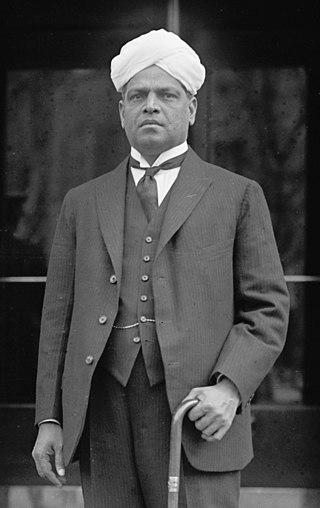
Valangaiman Sankaranarayana Srinivasa Sastri was an Indian politician, administrator, educator, orator and Indian independence activist. He was acclaimed for his oratory and command over the English language. Srinivasa Sastri was born to a poor temple priest in the village of Valangaiman near Kumbakonam, India. He completed his education at Kumbakonam and worked as a school teacher and later, headmaster in Triplicane, Madras. He entered politics in 1905 when he joined the Servants of India Society. Sastri served as a member of the Indian National Congress from 1908 to 1922, but later resigned in protest against the Non-Cooperation movement. Sastri was one of the founding members of the Indian Liberal Party. In his later days, he was strongly opposed to the partition of India.

Seshadri Srinivasa Iyengar CIE, also seen as Sreenivasa Iyengar and Srinivasa Ayyangar, was an Indian lawyer, freedom-fighter and politician from the Indian National Congress. Iyengar was the Advocate-General of Madras Presidency from 1916 to 1920. He also served as a member of the bar council from 1912 to 1920, the law member of Madras Presidency from 1916 to 1920 and as the president of the madras province Swarajya Party faction of the Indian National Congress from 1923 to 1930. Srinivasa Iyengar was the son-in-law of renowned lawyer and first Indian Advocate-general of Madras, Sir Vembaukum Bhashyam Aiyangar. Iyengar's followers called him Lion of the South.

Paramasiva Subbarayan was an Indian politician, freedom fighter and diplomat and was the Chief Minister of Madras Presidency, India's ambassador to Indonesia and Union Minister of Transport and Communications in Jawaharlal Nehru's government. He was the father of General P. P. Kumaramangalam, who served as India's Chief of Army staff, and of politician Mohan Kumaramangalam. He was also the grandfather of INC and BJP politician and Union Minister Rangarajan Kumaramangalam.
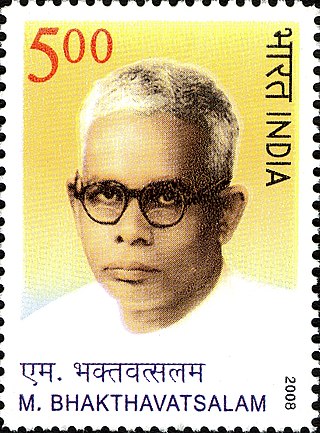
Minjur Bhakthavatsalam was an Indian independence activist and politician who served as the chief minister of Madras State from 2 October 1963 to 6 March 1967. He was the last Congress chief minister of Tamil Nadu and the last to have taken part in the Indian independence movement.
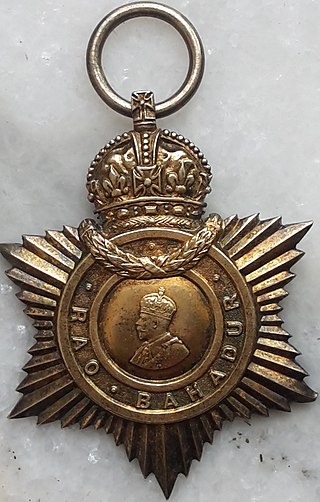
Rao Bahadur and Rai Bahadur, abbreviatedR.B., was a title of honour bestowed during British rule in India to individuals for faithful service or acts of public welfare to the Empire. From 1911, the title was accompanied by a medal called a Title Badge. Translated, Rao means "prince", and Bahadur means "brave" or "most honourable". Bestowed mainly on Hindus, the equivalent title for Muslim and Parsi subjects was Khan Bahadur. For Sikhs it was Sardar Bahadur.

Ganapathy Dikshitar Subramania Iyer was a leading Indian journalist, social reformer and freedom fighter who founded 'The Hindu' English newspaper on 20 September 1878. He was proprietor, editor and managing director of The Hindu from 20 September 1878 to October 1898. Tamil language newspaper 'Swadesamitran' was also founded by him in 1882.
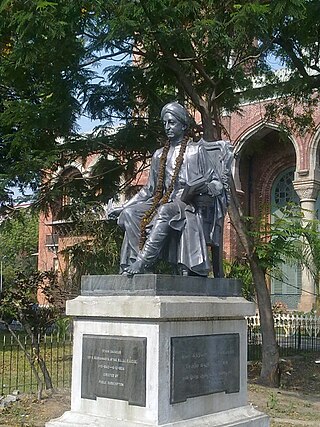
Sir Subbier Subramania Iyer was an Indian lawyer, jurist and freedom fighter who, along with Annie Besant, founded the Home Rule Movement. He was popularly known as the "Grand Old Man of South India".
Diwan Bahadur Rishiyur Venkata Srinivasa Aiyar was an Indian civil servant, legislator and politician from the Madras Presidency.
Rao Bahadur Sir Annepu Parasuramdas PatroKCIE was an Indian politician, zamindar and education minister in the erstwhile Madras Presidency.

Eardley John Norton was a Madras barrister, coroner and politician of British origin. He was also one of the earliest members of the Indian National Congress and a champion of civil liberties and rights of the Indian people.

Rao Bahadur S. A. Saminatha Iyer, also known as Thanjavur Saminatha Iyer, was an Indian lawyer, landlord, politician and theosophist who served as Chairman of the Tanjore municipality and a delegate to the 1885, 1886, 1887, 1889 and 1894 sessions of the Indian National Congress. He spoke against salt tax in the first session conducted in 1885 and in 1887, was a part of a 32-member team that wrote the constitution of the Congress. Christopher Baker and D. A. Washbrook describe him as the "most celebrated spokesman of the Tanjore gentry".

Raja Sir Savalai Ramaswami Mudaliar (1840–1911) was an Indian merchant, dubash, politician and philanthropist who was known for his wealth. He was also one of the early leaders of the Indian National Congress.
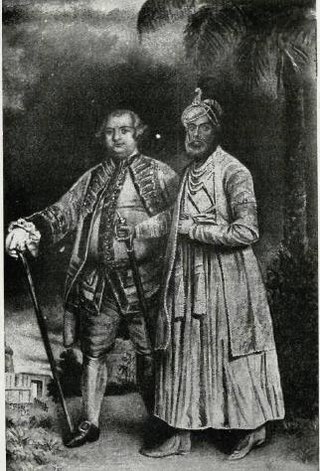
Madras Presidency was an administrative subdivision (presidency) of British India. At its greatest extent, Madras Presidency included much of southern India, including the present-day Indian State of Tamil Nadu, the Malabar region of North Kerala, Lakshadweep Islands, the Coastal Andhra and Rayalaseema regions of Andhra Pradesh, Brahmapur and Ganjam districts of Orissa and the Bellary, Dakshina Kannada, and Udupi districts of Karnataka. The presidency had its capital at Madras.
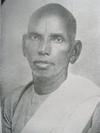
Konda Venkatappayya or Konda Venkatappaiah B.L. (1866–1948) was a noted Indian lawyer, freedom fighter, and politician from what is now Andhra Pradesh. He was one of the founders and the first editor of Krishna Patrika, a leading weekly Telugu magazine during the early 20th century.
The Indian independence movement had a long history in the Tamil-speaking districts of the then Madras Presidency going back to the 18th century.
The Women's suffrage movement in India fought for Indian women's right to political enfranchisement in Colonial India under British rule. Beyond suffrage, the movement was fighting for women's right to stand for and hold office during the colonial era. In 1918, when Britain granted limited suffrage to women property holders, the law did not apply to British citizens in other parts of the Empire. Despite petitions presented by women and men to the British commissions sent to evaluate Indian voting regulations, women's demands were ignored in the Montagu–Chelmsford Reforms. In 1919, impassioned pleas and reports indicating support for women to have the vote were presented by suffragists to the India Office and before the Joint Select Committee of the House of Lords and Commons, who were meeting to finalize the electoral regulation reforms of the Southborough Franchise Committee. Though they were not granted voting rights, nor the right to stand in elections, the Government of India Act 1919 allowed Provincial Councils to determine if women could vote, provided they met stringent property, income, or educational levels.














